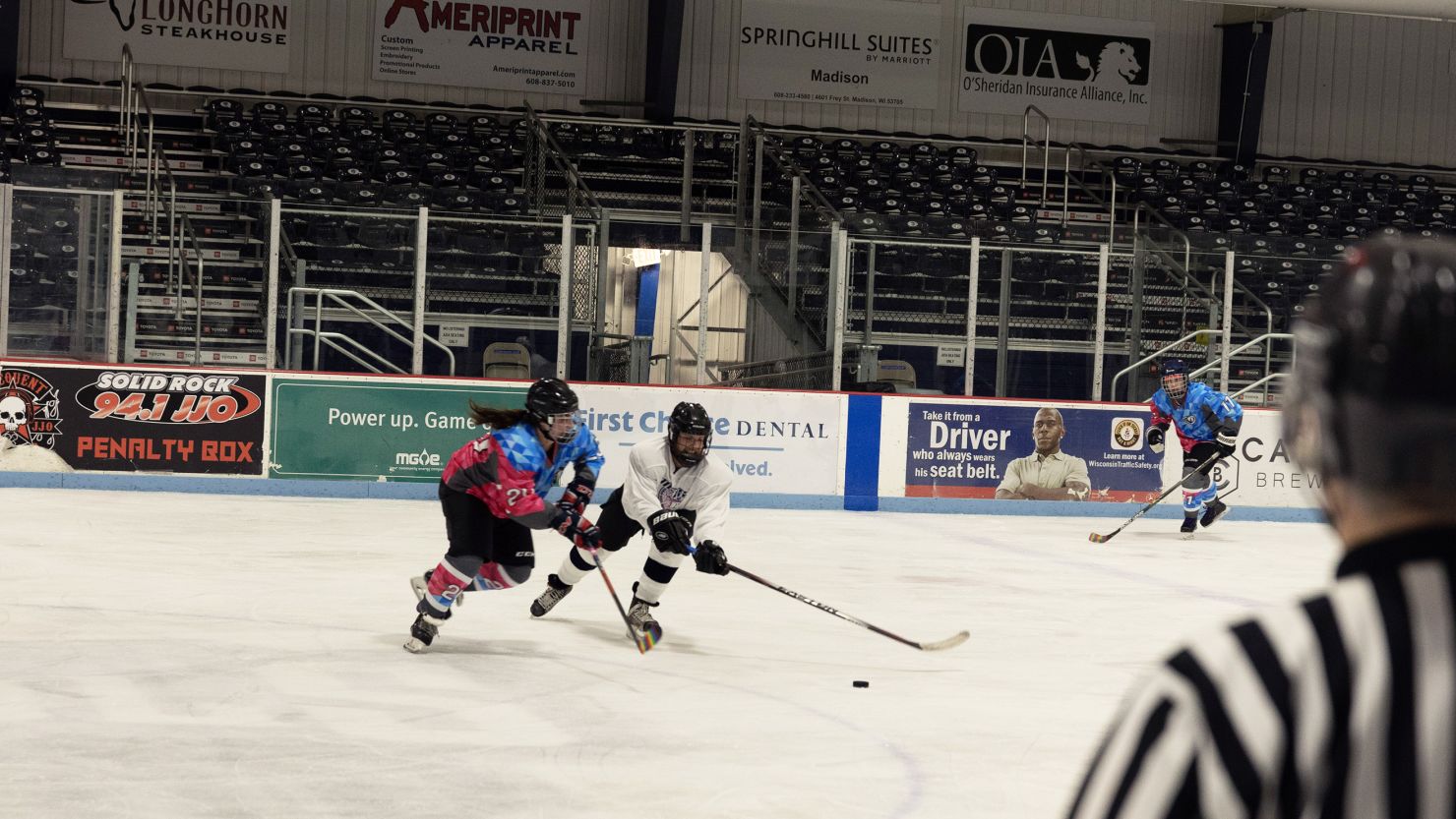Editor’s Note: Danielle McLean is a trans woman playing women’s hockey in the Washington, DC, Maryland and Virginia region. She is a senior editor at the news publication Smart Cities Dive and an at-large member of the Society of Professional Journalists’ board of directors. The views expressed here are the author’s own. Read more opinion on CNN.com
Between rounds of chemotherapy during my senior year of high school, as I battled Hodgkin’s lymphoma, I still practiced and competed in games on the boys’ varsity ice hockey team.
Chemo had completely worn my body down: I could only last a single, one-minute shift during each three-period game before the muscles in my legs began to feel as if they were pushing through my skin. But during those brief few minutes of playing time, I felt free, whole – as if my troubles did not exist.

After graduating from college, I moved from my parents’ home to an apartment on the outskirts of Boston. I had the support of my amazing family and a small group of friends. But I still felt isolated and sad, as if I were climbing an insurmountably steep mountain, alone.
Hockey took on even greater meaning in my life after I began my male-to-female gender transition over a decade ago. After I started transitioning, a large number of my childhood friends rejected me. The first couple of years during my transition were tough: During one particularly rough three-month period, I posed as a man at work while living my true identity outside it.
Throughout my transition, I remained active in my sport. I tried playing adult men’s “beer league” hockey at first, but I didn’t feel safe physically, since I was playing against large bodies as my own body was rapidly changing and losing muscle mass.
And playing in that league only added to my anxiety, since I didn’t feel comfortable expressing my true identity in front of my teammates. I was certain that my male teammates wouldn’t accept my transition. I felt like a complete outsider, as if I had something to hide every time I stepped in the locker room – whether I was covering up the physical changes I was experiencing because of transitioning, or lying about my life off the ice.
Two years after starting hormones, I joined a local adult women’s hockey team in the Boston area. That’s when everything started to change for me – emotionally and socially.
My teammates, with whom I shared a love of our sport, became a core part of my new social circle. Most of them knew that I was trans, but didn’t care. They accepted me as one of their own. For whatever reason – perhaps because our connection was not anchored in superficial ideals of masculinity – they loved me for me.
Through the recreational women’s hockey league that I competed in, I was able to build a new support system. That includes some of my best friends and my amazing partner of three years.
Over the years, I’ve gone to teammates’ weddings and baby showers and supported them through some of the hardest moments of their lives. Our sports connection has provided me with community and a social support system. But it’s also given me much more: Women’s hockey has allowed me to escape my anxieties and let out my frustrations.
Transitioning is one of the hardest things I’ve ever faced in my life. The outlet of women’s hockey saved me.
A 2021 survey by the Trevor Project – a nonprofit focused on suicide prevention in LGBTQ youth – found that more than half of transgender and nonbinary youth considered taking their own lives over the previous year. I’ve personally spoken to several trans and gender nonconforming people who considered or attempted suicide. I even dissuaded one friend – a trans woman who announced their suicidal intentions on social media – from harming themself on the phone one difficult night.
In my experience, the anxieties that the vast majority of trans people feel are not based on regret, but rather on whether they will ever be accepted in their true identities. They also experience discrimination, harassment, poverty and challenges accessing transition-related medical treatment, as well as lacking a sense of affirmation. Today’s politics, in which our very identities are being targeted by malicious discourse and discriminatory legislation, have only made things worse.
About a dozen states, including Oklahoma, Arizona, Iowa and Florida, have passed laws banning trans athletes from participating in sports teams consistent with their gender identity. These laws really only target young trans kids in school who are looking to express themselves, play sports with their friends or who like me, escape their anxieties through competition.
Politicians who try to make bogeymen of trans athletes make it seem as if they are taking over sports. But Utah’s Republican Gov. Spencer Cox noted when he vetoed such a ban in his state recently, there are 75,000 kids playing high school sports in his state – only four are transgender, and just one plays girls’ sports.
“Four kids who aren’t dominating or winning trophies or taking scholarships. Four kids who are just trying to find some friends and feel like they are a part of something. Four kids trying to get through each day. Rarely has so much fear and anger been directed at so few,” Cox said in his remarks last month. “I don’t understand what they are going through or why they feel the way they do. But I want them to live.”
His veto was overridden by Utah’s Republican-controlled Legislature.
Gov. Cox is right that trans women and youth are not dominating women’s and girls’ sports the way that supporters of these bills would lead you to believe. One recent study by the British Journal of Sports Medicine found that trans women in the US Air Force had only slightly faster running speeds and indistinguishable muscle mass compared to their cisgender peers after two years of hormones. The report’s authors also said trans teens who took puberty blockers and estrogen probably have no advantage at all.
People who oppose allowing trans girls and women to play on women and girls’ teams offer no realistic alternative. During the times I’ve competed against men since transitioning, I’ve been physically dominated in front of the net, and even tore my knee during one fight for the puck. And critics also leave out the fact that a lot of cisgender women are really, really good at sports: I’ve been playing hockey since I was 4 – it’s a huge part of my life. Yet, there are a number of players on my team who are larger and stronger than I am. I often have trouble keeping up with the much faster and more skilled women’s hockey talent I’ve played with and against.
In addition to playing for a regional women’s hockey league, I play on Team Trans, a collection of some 50 trans and gender nonconforming hockey players in the US and Canada. The team has only competed together a couple of times since its inception a few years ago because of the Covid-19 pandemic and the geographic distances between players, who are scattered throughout North America.
I and other trans women would like to be the best we could be at the top levels of the sports we’ve spent our entire lives training for – that means competing with and against other dedicated women athletes. No athlete should be subjected to abuse from politicians, online trolls and international news outlets for competing in the sport they love. They should not have to feel as though they are letting down their community or being placed in a fishbowl of hate when they achieve a level of success.
I don’t know how NCAA swimmer Lia Thomas has managed to cope with the venom directed at her after winning a single event at the NCAA D-1 National Swimming championships last month. Analyses breaking down her physique and her body chemistry have been splashed over the fronts of national publications and covered by news outlets, including CNN.
Thomas is just an athlete in her early 20s competing in the sport she has trained in for her entire life. While commentators claim to care about women’s sports, there’s little coverage of the successes of her non-trans competitors during those meets. She’s become the target of criticism from people as powerful as Ron DeSantis, the governor of Florida and a possible future presidential contender. I can’t imagine it’s been easy for her.
The anti-trans invective against Thomas is offered as evidence that she, a person trying to battle gender dysphoria, is less than woman. This disgusting hate could send trans athletes down a dark emotional road that way too many have gone down in the past – a path of dejection and despair. I pray that this “debate” is only a flashpoint in time and that opportunities for trans athletes to find peace through sports – in the face of sometimes grueling life experiences – is not taken away.
More than anything, I want trans kids to be able – as I have – to find love and support through sports, even after their friends and family support dissolve off the field, court, pool or ice. I know that some trans people are staying in the closet and possibly contemplating suicide because of terrible, unfair laws being passed around the country. I pray they continue to live, and that things will one day get better.
If you are experiencing a suicidal crisis, you can call the National Suicide Prevention Lifeline at 800-273-8255 or text the Crisis Text Line by texting HOME to 741741 to get help.






